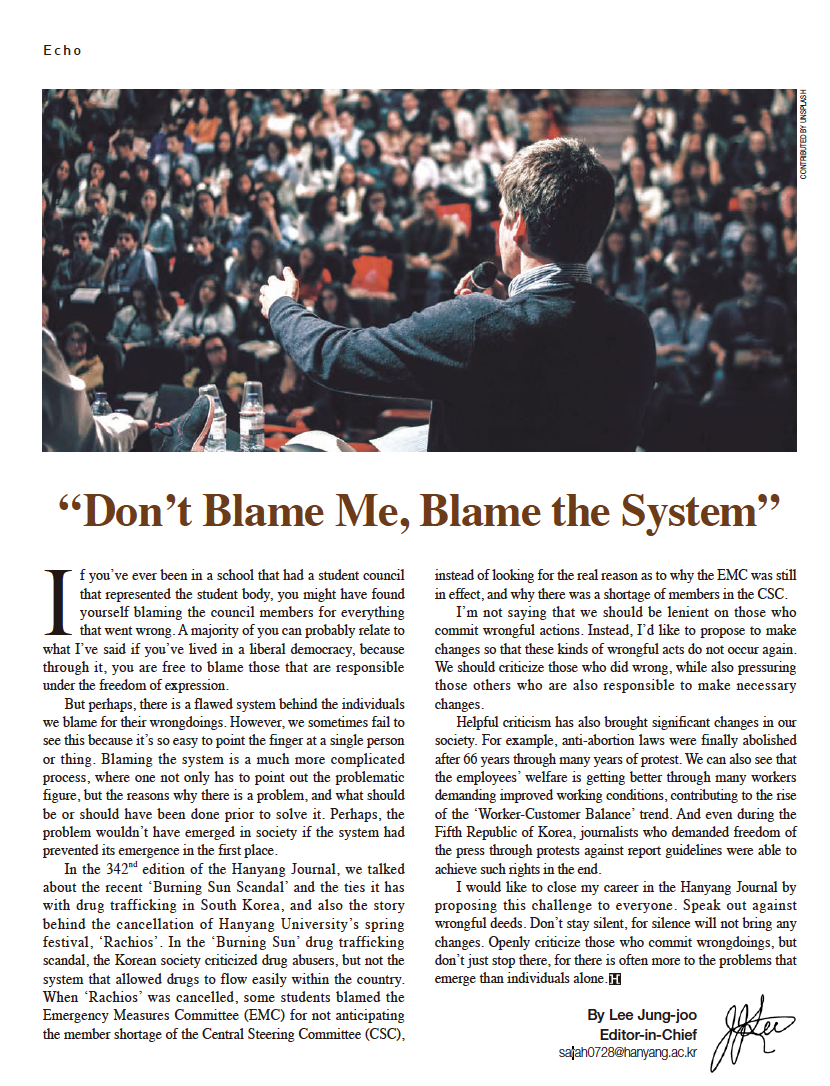
If you’ve ever been in a school that had a student council that represented the student body, you might have found yourself blaming the council members for everything that went wrong. A majority of you can probably relate to what I’ve said if you’ve lived in a liberal democracy, because through it, you are free to blame those that are responsible under the freedom of expression.
But perhaps, there is a flawed system behind the individuals we blame for their wrongdoings. However, we sometimes fail to see this because it’s so easy to point the finger at a single person or thing. Blaming the system is a much more complicated process, where one not only has to point out the problematic figure, but the reasons why there is a problem, and what should be or should have been done prior to solve it. Perhaps, the problem wouldn’t have emerged in society if the system had prevented its emergence in the first place.
In the 342nd edition of the Hanyang Journal, we talked about the recent ‘Burning Sun Scandal’ and the ties it has with drug trafficking in South Korea, and also the story behind the cancellation of Hanyang University’s spring festival, ‘Rachios’. In the ‘Burning Sun’ drug trafficking scandal, the Korean society criticized drug abusers, but not the system that allowed drugs to flow easily within the country. When ‘Rachios’ was cancelled, some students blamed the Emergency Measures Committee (EMC) for not anticipating the member shortage of the Central Steering Committee (CSC), instead of looking for the real reason as to why the EMC was still in effect, and why there was a shortage of members in the CSC.
I’m not saying that we should be lenient on those who commit wrongful actions. Instead, I’d like to propose to make changes so that these kinds of wrongful acts do not occur again. We should criticize those who did wrong, while also pressuring those others who are also responsible to make necessary changes.
Helpful criticism has also brought significant changes in our society. For example, anti-abortion laws were finally abolished after 66 years through many years of protest. We can also see that the employees’ welfare is getting better through many workers demanding improved working conditions, contributing to the rise of the ‘Worker-Customer Balance’ trend. And even during the Fifth Republic of Korea, journalists who demanded freedom of the press through protests against report guidelines were able to achieve such rights in the end.
I would like to close my career in the Hanyang Journal by proposing this challenge to everyone. Speak out against wrongful deeds. Don’t stay silent, for silence will not bring any changes. Openly criticize those who commit wrongdoings, but don’t just stop there, for there is often more to the problems that emerge than individuals alone.

